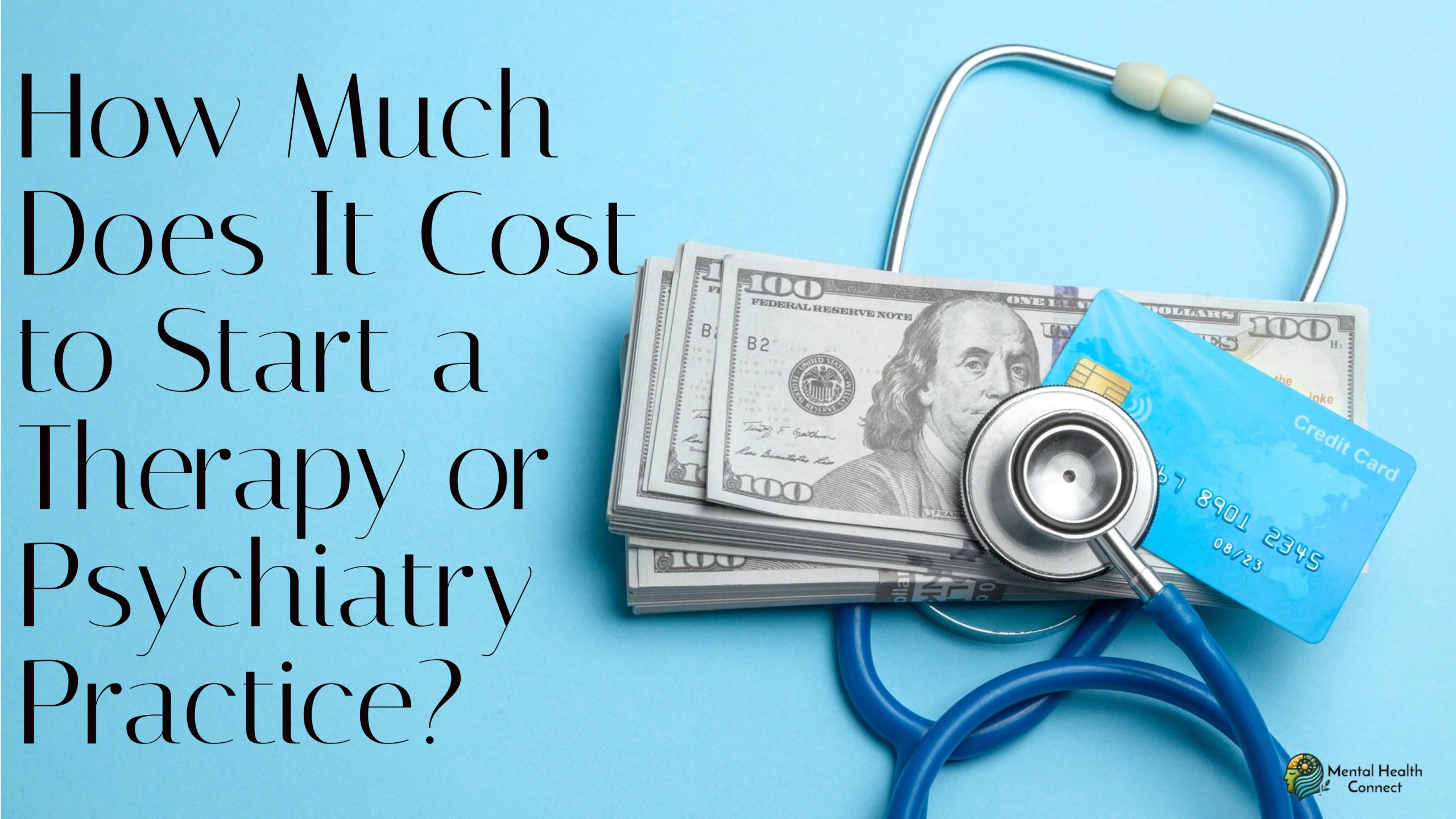How Much Does It Cost to Start a Therapy or Psychiatry Practice?

Launching your own mental health practice represents a significant milestone that balances professional freedom with considerable financial investment. Whether you’re a psychologist, therapist, or psychiatrist, establishing an independent practice requires careful financial planning and budgeting. This comprehensive guide breaks down the costs associated with launching a therapy or psychiatry practice, helping you prepare for this important career step.
Initial Business Formation Costs
Before seeing your first client, you’ll need to establish your practice as a legitimate business entity. These foundational costs include:
Legal Structure and Registration: $500-$2,000
- Business entity formation (LLC, PLLC, S-Corp): $100-$800
- Business attorney consultation: $250-$500 per hour
- Business licenses and permits: $50-$500
- EIN (Employer Identification Number): $0 (free through IRS)
- State-specific registration fees: $50-$400
Insurance Coverage: $1,500-$5,000 annually
- Professional liability insurance: $1,000-$2,500 per year
- General business liability insurance: $500-$1,500 per year
- Business property insurance: $500-$1,000 per year
- Workers’ compensation (if hiring employees): Varies by state and payroll
Professional Credentials: $500-$3,000
- License application and renewal fees: $200-$1,000
- Board certification costs: $300-$1,000
- DEA registration (for psychiatrists): $731-$888 for three years
- Professional association memberships: $150-$500 annually
Physical Office Setup
Creating a therapeutic environment requires thoughtful investment in your physical space:
Location Options
- Leasing dedicated office space: $1,500-$5,000+ monthly
- Security deposit: Usually equal to 1-2 months’ rent
- Utilities: $200-$500 monthly
- Internet and phone: $150-$300 monthly
- Office maintenance: $100-$300 monthly
- Renting by the hour: $15-$40 per hour
- Many therapists start by using shared spaces or renting rooms in existing practices
- Home office conversion: $2,000-$10,000 one-time cost
- Separate entrance considerations
- Soundproofing: $1,000-$3,000
- Zoning permits: $50-$500 (varies by location)
Furnishings and Equipment: $2,500-$10,000
- Therapy seating: $500-$2,500
- Desk and practitioner chair: $500-$1,500
- Filing cabinets (lockable): $200-$800
- Waiting room furniture: $500-$2,000
- Lighting fixtures: $200-$1,000
- Office decor and artwork: $300-$1,500
- White noise machines: $50-$200
- Basic medical equipment (for psychiatrists): $500-$2,000
Technology Infrastructure
Modern practices require robust digital solutions:
Hardware: $2,000-$5,000
- Computer or laptop: $800-$2,500
- Printer/scanner: $200-$600
- Phone system: $200-$1,000
- Webcam and microphone (for telehealth): $100-$500
- Backup storage devices: $100-$300
Software and Services: $200-$800 monthly
- Electronic Health Records (EHR) system: $200-$600 monthly
- Practice management software: $50-$300 monthly
- Telehealth platform: $40-$200 monthly
- Accounting software: $20-$150 monthly
- Website hosting: $15-$50 monthly
- Email service: $5-$20 monthly
- Cybersecurity protection: $20-$100 monthly
Marketing and Brand Development
Attracting clients requires strategic marketing investment:
Online Presence: $1,000-$8,000
- Website design and development: $500-$5,000
- Professional logo design: $300-$1,500
- Professional photography: $200-$1,000
- Content creation: $500-$2,000
- SEO optimization: $300-$1,000 (or $100-$500 monthly for ongoing services)
Directory Listings: $500-$2,000 annually
- Psychology Today profile: $30-$35 monthly
- Therapy Den listing: Free
- Good Therapy membership: $30 monthly
- Other niche directories: $0-$50 monthly each
Marketing Materials: $300-$1,500
- Business cards: $50-$200
- Brochures: $100-$500
- Office signage: $150-$800
- Welcome packets: $5-$15 per new client
Administrative Costs
Running the business side of your practice involves ongoing expenses:
Billing and Financial Management: $200-$2,000 monthly
- Medical billing service: 5-10% of collections or $200-$1,000 monthly
- Credentialing services: $1,000-$2,000 initial, then $100-$300 monthly
- Credit card processing fees: 2.5-3.5% per transaction
- Bookkeeping services: $200-$500 monthly
Administrative Support: $0-$4,000 monthly
- Virtual receptionist: $250-$600 monthly
- Administrative assistant: $15-$25 per hour (part-time) or $2,500-$4,000 monthly (full-time)
- Scheduling software: $30-$100 monthly (if not included in EHR)
Ongoing Professional Development: $1,000-$5,000 annually
- Continuing education requirements: $500-$2,000 annually
- Clinical supervision: $100-$200 per session
- Professional books and resources: $200-$1,000 annually
- Specialized training certifications: $500-$3,000 per certification
Breaking Down Startup Scenarios
Minimal Startup ($10,000-$20,000)
- Part-time practice in shared office space
- Limited hours in rented space: $500-$1,500 monthly
- Basic technology setup: $2,000-$3,000
- DIY website and marketing: $1,000-$2,000
- Essential legal and insurance coverage: $2,000-$4,000
- Self-managed billing and administration
Mid-Range Startup ($20,000-$50,000)
- Full-time practice in dedicated leased space
- Office lease and setup: $8,000-$20,000
- Complete technology infrastructure: $3,000-$7,000
- Professional marketing services: $3,000-$7,000
- Comprehensive insurance coverage: $3,000-$5,000
- Part-time administrative support: $1,000-$2,000 monthly
Premium Startup ($50,000-$100,000+)
- Multi-provider practice or specialized psychiatry practice
- Premium location and extensive renovations: $20,000-$50,000
- Advanced technology and security systems: $10,000-$20,000
- Comprehensive marketing campaign: $10,000-$20,000
- Full-time support staff: $3,000-$6,000 monthly
- Complete business infrastructure: $10,000-$20,000
Funding Your Practice
Consider these options to finance your startup costs:
- Personal savings: Most common funding source
- Small business loans: 5-10% interest rates, 3-10 year terms
- SBA loans: Often better rates, but more paperwork
- Business credit cards: Convenient but higher interest rates
- Family and friends investments: Requires clear agreements
- Gradual scaling: Starting part-time while maintaining other employment
Return on Investment Considerations
Understanding potential returns helps evaluate startup investments:
- Average therapy session rate: $100-$250
- Average psychiatry session rate: $200-$500
- Typical client load: 20-30 weekly sessions when established
- Potential gross revenue: $150,000-$400,000 annually
- Operating expenses: 30-50% of gross revenue
- Time to profitability: Usually 6-24 months
Cost-Saving Tips for New Practitioners
- Start with a shared office space or part-time rental
- Phase purchases based on immediate necessity
- Consider gently used furniture from closing practices
- Utilize free or low-cost marketing through networking
- Join group practices initially to share overhead costs
- Use integrated practice management systems to reduce software costs
- Consider telehealth to minimize physical space requirements
- Outsource only essential administrative functions initially
Final Considerations
When planning your practice budget, remember to:
- Create a 12-month cash flow projection
- Build in a contingency fund (at least 3-6 months of expenses)
- Consider your local market’s specific costs and regulations
- Factor in credential-specific requirements and limitations
- Assess insurance panel participation costs and benefits
- Balance quality investments with financial constraints
- Prioritize client experience in spending decisions
Starting a therapy or psychiatry practice represents a significant financial investment, but with careful planning and strategic decision-making, it can provide both professional autonomy and financial stability. By understanding the full range of startup costs, you can create a realistic budget that sets your practice up for long-term success.
-
 Beyond Words: The Emotional Medicine of a Simple HugOctober 27, 2025
Beyond Words: The Emotional Medicine of a Simple HugOctober 27, 2025 -
 Music’s Unique Therapeutic BenefitsOctober 23, 2025
Music’s Unique Therapeutic BenefitsOctober 23, 2025

Leave a Reply